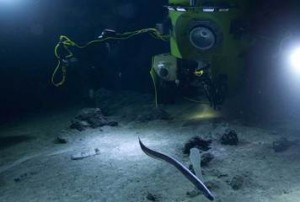Hollywood Director Advocates for Oceanic Research

A few weeks ago, James Cameron, director of Hollywood blockbusters "Titanic" and "Avatar," testified before the U.S. Senate's Oceans, Atmosphere, Fisheries, and Coast Guard Subcommittee, urging them to maintain federal programs aimed at oceanic research. Although he is best known for making movies, James Cameron is also a deep sea explorer, reaching the bottom of the Mariana Trench in the Pacific Ocean last year, more than five miles below the ocean surface. The data taken during that dive revealed new species of sea cucumber, worms, and amoeba, all of which are remarkable for their ability to survive in a such an extreme environment. These discoveries highlight the gaps in our knowledge of the oceans, despite the fact that they cover more than two-thirds of the planet's surface. A large portion of the world's population live near the coasts and that portion is expected to grow as people migrate to coastal cities over the course of the next century. Knowing the effects of climate change on the world's oceans can help to predict natural disasters like Hurricane Sandy and protect those populations. There is also a strong economic incentive to devote resources to oceanic research. The circulation of warm and cold water in the ocean helps to regulate the weather over land, which means that the changes in the ocean can play a role in events like last year's drought in the Midwestern United States. The lack of precipitation lowered crop yields and raised food prices. In addition, increasing ocean temperatures and acidity from human activity threatens the survival of oceanic ecosystems, which fishing industries rely on for their continued survival. By testifying before the Senate, James Cameron is almost certainly trying to rely on his star-power to bring the spotlight on the world's oceans and inspire people to take action. If we do not, we may miss out on immense potential hidden beneath the waves. You can learn more about James Cameron's testimony to the Senate here.
- Most Viewed Blog Articles (5)
- Company News (284)
- Emerging Technologies (64)
- Microbiology and Life Science News (93)
- Water and Fluid Separation News (97)
- Filtration Resources (93)
- Product News (19)

![Join Sterlitech at BIO 2024 [Booth #5558]: Exploring the Future of Biotechnology](https://www.sterlitech.com/media/blog/cache/300x200/magefan_blog/b4.jpeg)




